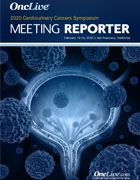Novel Agent MK-6482 Shows Promise in Renal Cell Carcinoma
The oral hypoxia-inducible factor-2α inhibitor MK-6482 induced a partial response rate of 24% and a disease control rate of 80% in patients with advanced clear cell renal cell carcinoma.
Toni K. Choueiri, MD
The oral hypoxia-inducible factor (HIF)-2α inhibitor MK-6482 induced a partial response rate of 24% and a disease control rate of 80% in patients with advanced clear cell renal cell carcinoma (ccRCC), according to findings from a phase I/II study presented at the 2020 Genitourinary Cancers Symposium.1
Overall, 13 of 55 patients had partial responses, and responses occurred regardless of disease risk status. The duration of response had yet to be reached, but the vast majority of responses persisted to 6 weeks and beyond.
“After a median follow-up of 13 months, we observed promising clinical activity in patients with heavily pretreated advanced clear cell renal cell carcinoma,” said Toni Choueiri, MD, PhD, of Dana-Farber Cancer Institute. “A majority of the patients had received 3 or more prior lines of therapy. A phase III trial of MK-6482 is ongoing in patients with previously treated advanced clear cell renal cell carcinoma.”
The rationale for targeting HIF-2α came from the observation that 90% of patients with ccRCC have Von Hippel-Lindau tumor suppressor gene protein.2 VHL protein loss of function results in HIF-2α activation.3
Choueiri reported findings from a dose-escalation/expansion cohort trial involving patients with advanced ccRCC treated with at least 1 prior line of therapy. The trial’s key endpoints were safety, objective response rate (ORR), duration of response (DOR), and progression-free survival (PFS).
The study population had a median age of 62, and 44 of the 55 patients were men. The patients had received a median of 3 prior systemic regimens, and 34 had received 3 or more prior therapies. The vast majority (93%) of the patients had received a VEGF inhibitor and an immune checkpoint inhibitor (73%). Two-thirds of the patients had received both anti—PD-1 and anti-VEGF therapies.
Safety data showed that two-thirds of the patients had grade 3 to 5 adverse events (AEs) and about a third had grade 3 to 5 treatment-related AEs (TRAEs). Five patients discontinued treatment because of AEs, including 2 because of TRAEs.
Two patients had a total of 4 grade 4 AEs (hypercalcemia, sepsis, cardiac arrest, and respiratory failure), and 4 patients had grade 5 (fatal) AEs associated with disease progression (acute kidney injury, disease progression, malignant neoplasm progression, and ventricular fibrillation). No fatal TRAEs occurred during the trial.
The most common AEs (all grades) were anemia (75%), fatigue (67%), dyspnea (47%), nausea (33%), cough (31%), peripheral edema (29%), vomiting (29%), headache (26%), hypoxia (26%), arthralgia (24%), dizziness (24%), diarrhea (22%), increased blood creatinine (22%), constipation (20%), and hyperkalemia (20%). The most common grade 3 AEs were anemia (26%) and hypoxia (15%).
The treatment led to an ORR of 24%, and all responses were partial responses. Partial responses occurred in 2 of 5 patients with favorable-risk disease, 10 of 40 with intermediate-risk disease, and 1 of 10 with poor-risk disease characteristics. Additionally, 31 patients had stable disease as best response to treatment. The distribution of stable disease across risk categories was similar to the distribution of objective responses. Tumor shrinkage occurred in 38 (69%) of the 55 patients.
Choueiri reported that 16 (29%) patients continued treatment beyond 12 months, and 81% of responses lasted 6 months or longer.
Overall, the treatment led to a median PFS of 11.0 months, including a 12-month PFS of 49%. Median PFS ranged from 16.5 months for favorable-risk patients, to 11.0 months for the intermediate-risk group, to 6.9 months for patients with poor-risk disease characteristics.
Investigators in the phase III trial of MK-6482 (NCT04195750) will enroll patients with metastatic ccRCC, previously treated with a PD-1/L1 inhibitor and VEGF-targeted therapy but with no more than 3 prior systemic therapies. The trial has an accrual target of 736 patients, who will be randomized 1:1 to single-agent MK-6842 or everolimus (Afinitor). The trial has coprimary endpoints of PFS and overall survival.
References
- Choueiri TK, Plimack ER, Bauer TM, et al. Phase I/II study of the oral HIF-2 α inhibitor MK-6482 in patients with advanced clear cell renal cell carcinoma (RCC). Presented at: GU Cancers Symposium; February 13-15, 2020; San Francisco, CA. Abstract 611.
- Shen C1, Kaelin WG Jr. The VHL/HIF axis in clear cell renal carcinoma. Semin Cancer Biol. 2013;23(1):18-25. doi: 10.1016/j.semcancer.2012.06.001.
- Sato Y, Yoshizato T, Shiraishi Y, et al. Integrated molecular analysis of clear-cell renal cell carcinoma. Nat Genet. 2013;45(8):860-867. doi: 10.1038/ng.2699.




